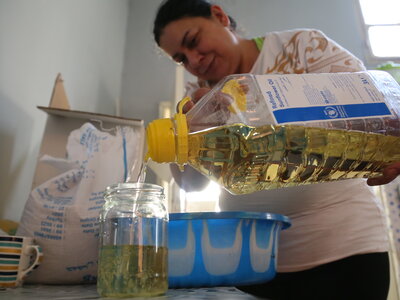Lebanon
- 2.7 million people
- need food assistance
- 21 percent
- of people are food insecure (Lebanese and refugees)
- 5.3 million
- population
Lebanon, a small and densely populated country in a region beset by conflict and political instability, continues to experience a profound socioeconomic emergency on top of the protracted Syrian refugee crisis.
The country is facing one of the worst economic crises in modern history, with the national currency losing over 98 percent of its value since 2019. Record-high currency depreciation has seen food inflation soaring to 6,500 percent in the local currency compared to pre-COVID-19 levels. According to the latest World Bank report issued in May 2024, poverty has more than tripled over the past decade, reaching 44 percent of the population.
The human impact remains severe: one in five people in Lebanon – around 1.17 million – are facing acute food insecurity. While there has been a gradual recovery towards pre-war levels of food insecurity since the peak of the conflict, gains are fragile. Damage to agricultural infrastructure, economic stagnation, and declining humanitarian aid continue to push families to the brink. Projections show this number could rise to 1.24 million between July and October 2025.
The World Food Programme helps ensure people can secure their food and basic needs, while supporting the Government’s social safety nets and the country’s food systems.
What the World Food Programme is doing in Lebanon
-
Emergency response
-
WFP supplied hot meals, food supplies and cash assistance in shelters and communities across Lebanon in 2024, reaching 750,000 people displaced by fighting.
-
Economic crisis response
-
WFP is providing food parcels while carrying out assessments to ensure that assistance reaches those most in need.
-
Support to refugees
-
WFP provides food vouchers and cash assistance, through electronic cards, to Syrian refugees in Lebanon. Refugees can buy food in more than 400 WFP-contracted shops across the country. WFP also continues to provide daily hot meals support newly displaced Syrians.
-
School meals
-
Through community kitchens that support local food systems, WFP’s school meals programme now reaches around 107,000 students in 314 public schools with nutritious snacks and cold meals. The programme is set to expand to cover up to 130,000 students during this academic year, in close coordination with the Ministry of Education. To enhance dietary diversity, new baked snacks have been introduced and families have received sunflower oil distributions. In parallel, 184 caregiver mothers have been trained to support the initiative.
-
Social protection
-
WFP continues to provide technical assistance to Lebanon’s social protection system. This includes support to the AMAN safety net, which reached over 755,000 people in May 2025. In parallel, WFP is working with the Ministry of Social Affairs on recertification efforts, registration of internally displaced people, and strengthening the national call centre. Efforts are also under way to strengthen coordination and build a unified, shock-responsive safety net through database reviews, standard operating procedures, assistance mapping and data-sharing protocols.
-
Building resilience and supporting livelihoods
-
WFP is supporting the recovery of communities impacted by conflict. In 2024, WFP helped Lebanese and Syrian refugees restore their livelihoods through cash-for-work and training activities that improved community assets and agricultural land. Farmers received training sessions, while greenhouses were rehabilitated – boosting yields and reducing water use. WFP’s integrated approach is strengthening food systems, boosting incomes, and building resilience to future shocks, while scaling up support to farmers, SMEs, and climate-smart innovations as part of its post-conflict recovery plan.
Lebanon news releases
Go to pagePartners and donors
Find out more about the state of food security in Lebanon
Visit the food security analysis pageOperations in Lebanon
Contacts
Office
-
Beirut
Lebanon






